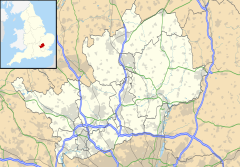Boxmoor
| Boxmoor | |
|---|---|
 St.John's Road, Boxmoor |
|
| Boxmoor shown within Hertfordshire | |
| OS grid reference | TL046064 |
| Shire county | |
| Region | |
| Country | England |
| Sovereign state | United Kingdom |
| Post town | Hemel Hempstead |
| Postcode district | HP3 |
| Dialling code | 01442 |
| Police | Hertfordshire |
| Fire | Hertfordshire |
| Ambulance | East of England |
| EU Parliament | East of England |
| UK Parliament | |
Boxmoor, or Boxmoor Village, is a district of Dacorum in Hertfordshire, England. It is now part of Hemel Hempstead. It is a district of mainly 19th century housing and meadowland, repeatedly cut through by transport links from London to the Midlands. At the 2011 Census the population of Boxmoor was included in the Dacorum ward of Bovingdon, Flaunden and Chipperfield.
The name Boxmoor derives from the box tree a bushy inhabitant of the chalky hills that surround the location. This is linked together with the word 'mor' which signifies a marshy spot; Boxmoor's ancient watermeadows are still a major feature of the locality.
The remains of a Roman villa have been found in the grounds of Boxmoor House School near the railway station dating from around the 1st or early 2nd century AD.
The Box Moor Trust owns meadow land in the area alongside the River Bulbourne. This was land purchased by tenants in secret during the 16th century to prevent it being enclosed and depriving them of grazing. It is still held by the same trust established at that time and is used for summer grazing and has open access for recreational use.
The ancient Box Lane runs uphill from Boxmoor to Bovingdon. On this lane, close to the Boxmoor end, stood the historic early 17th century Box Lane Chapel, see section below on places of worship.
The Sparrows Herne turnpike, set up in 1762, was the stagecoach route from London to Aylesbury and passed along the valley bottom through Boxmoor following the present day London Road (A4251). The Grand Junction Canal, latterly known as the Grand Union, and the trunk canal from London to the Midlands followed along the same route in 1804. A local pub, the Fishery Inn, was an historic refreshment stop on the canal.
Robert Snooks, in 1802, the last highwayman to be hanged and buried at the scene of his crime robbed a post boy on the turnpike on Boxmoor meadows. His remains are interred in Boxmoor meadows near the place where he was hanged and the likely spot is marked by two stones, erected by the Box Moor Trust in 1904.
...
Wikipedia

